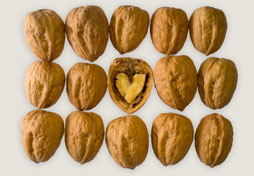Daily nut consumption can lower the risk of hypertension. However a recent study did not prove that nut consumption can prevent the occurrence of this disorder completely. The high content of magnesium, potassium and unsaturated fatty acids and the low content of sodium in raw tree nuts are factors that can be expected to play a role in this process. Therefore it is very likely that nuts can have a positive impact on the development of hypertension.
Hypertension is a major public health problem, since it is one of the underlying factors in developing cardiovascular disease. Approximately 1 billion people worldwide suffer from hypertension, and in the European countries this number is still increasing. Martínez-Lapiscina et al. analyzed the effect of nuts on the incidence of hypertension with data derived from the SUN cohort.
The SUN cohort is a dynamic prospective follow-up (cohort) study including exclusively Spanish university graduates. The recruitment of participants started in December 1999 and is permantly open. Nutritional information relating to the participants is collected every 2 years. The main objectives are to identify dietary determinants of hypertension, diabetes, obesity and coronary heart disease.
Self-reported data
From the 19,519 recruited subjects, 9,919 healthy subjects with a normal dietary pattern were included in this research. By means of a food-frequency questionnaire, information on the consumption of nuts (walnuts, almonds, hazelnuts and peanuts) was gathered. Subjects were classified in 4 categories based on the frequency of intake: rarely/never, one to three times per month, once per week and more than once per week. Also, the systolic and diastolic blood pressures were self-reported by the subjects. Hypertension was defined as occurring with a systolic blood pressure of ≥ 140 mm Hg and/or a diastolic blood pressure of ≥ 90 mm Hg.
No association nut consumption and hypertension
During the mean follow-up of 4.5 years the incidence of hypertension was 12.4 per 1,000 person-years. Among the total study group 542 new cases of hypertension were observed. Participants belonging to the highest category of nut consumption were likely to be men, older, non-smokers, physically more active and reported a higher frequency of hypercholesterolemia. Moreover, it seems that they had a higher intake of energy, alcohol and unsaturated fatty acids, and a lower intake of sodium and saturated fatty acid. Within the study, nut consumption was related positively to a higher intake of fruit, vegetable and fish, and inversely related to dairy and meat product intake. When taking diet, gender, age and other confounding factors into account, no association between nut consumption and the incidence of hypertension was detected.
Unsalted vs salted nuts
The authors suggested that the lack of the expected association between nut consumption and hypertension might be explained by the lack of distinction between unsalted and salted nuts. Generally, the Spanish population consumes salted nuts, thus this might interfere with the outcome of the study and negate the potential benefits of nuts. Further research on this topic is necessary to establish an answer as to whether nuts are beneficial in preventing the incidence of hypertension.
Source:
Martínez-Lapiscina E.H., Pimenta A.M., Beunza J.J., Bes-Rastrollo M., Martínez J.A., and Martínez-González M.A. Nut consumption and incidence of hypertension: The SUN prospective cohort. Nutrition, Metabolism and Cardiovascular Diseases; in press.

